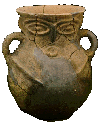|
|
goddesses
archaeomythology magazine


The Owl Goddess of Troy


The owl goddess is represented in over a thousand artifacts excavated from the prehistoric city of Troy by archaeologist Heinrich Schleimann.
Troy, famous for the Trojan Horse story, had existed on the Aegean coastal plane of Turkey for thousands of years prior to the burned layer Schleimann identified.
He believed it to be the iteration of Troy burned by Agememnon and his Mycenaean Greeks.
Many people don't really think much about where Troy is located. For those of you who have never given it a thought, Troy is on the west coast of Turkey.
However, owl goddess figurines have been found from far earlier eras than those of later day Troy.
Here are some quotes describing them, direct from Schleimann's book reporting his finds:
"These owl-faced female figures, which occur so frequently upon the cups, vases and idols, can be none other than Athena, the tutelary goddess of Troy."
The figure below was recently found in mid-Turkey, at one of the oldest human cities, a place still under excavation by an international team of archaeologists, Catal Huyuck. By the very fact that it was found at this site, where the earliest know domestication of wheat and cattle took place, it can be dated to somewhere around 9000 years ago.


"With the progress of (Hellenic Greek) civilization, Athena received a human face, and her former owl's head was transformed into her favourite bird, the owl."

Archaeologist Heinrich Schleimann
"My friend Professor Otto Keller has concluded with certainty "the existence of a Phrygian goddess Ate, her worship on the hill of Hissarlik (Troy) as well as on a second hill on the River Rhyndacus, and her idol which fell from heaven. The Ilian Athene, who originated from the Ate on a medal I discovered, appears to be an especially Phyrygian goddess, wearing the
Phrygian cap.
She is not the common Greek Ate or infatuation, who is a mere abstraction. Probably she is related to the Phrygian god Attis.
Owing to the similarity in the sound of their names, after the conquest of the land by the Greeks, Attis and Athene were combined, and thus originated the peculiar Hellenic goddess.
|
by Dean Adams Curtis |






